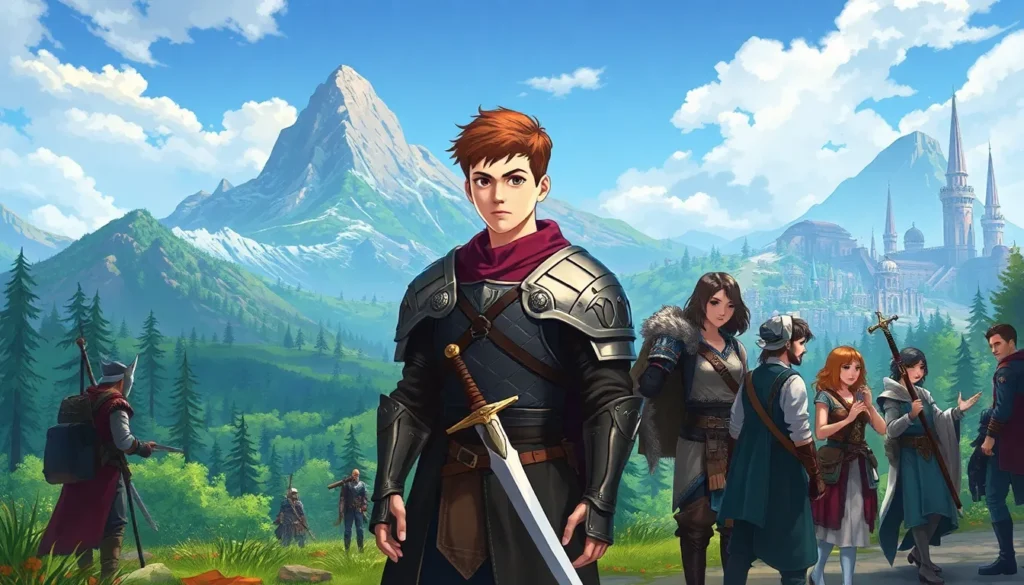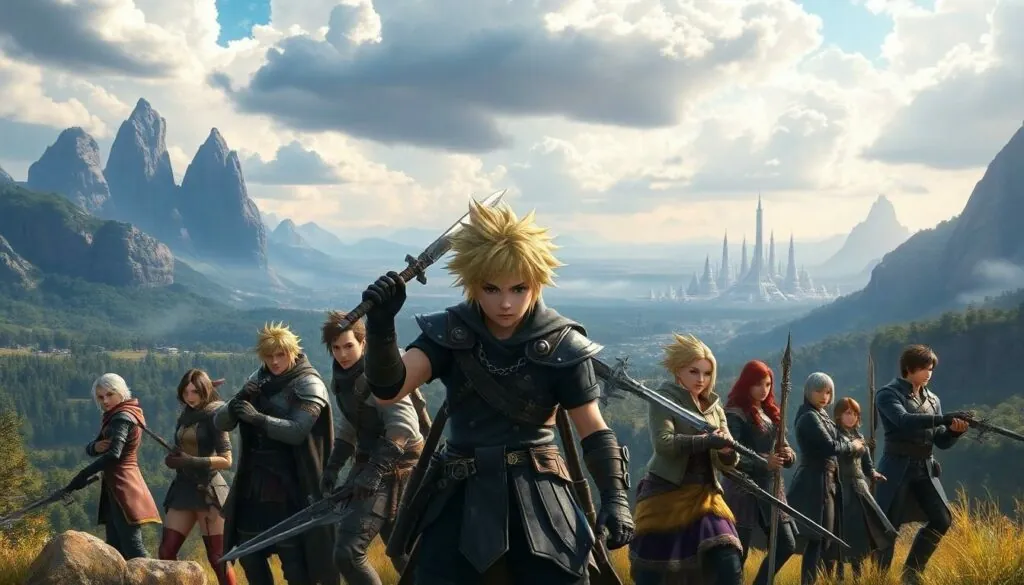In a world where reality can be a bit too mundane, MMORPG games swoop in like a heroic knight ready to rescue players from the clutches of boredom. These massively multiplayer online role-playing games offer an escape into vibrant realms filled with epic quests, mythical creatures, and the occasional dragon that just won’t stop hoarding treasure. Whether players are battling foes or forging alliances, the thrill of adventure awaits at every turn.
Imagine teaming up with friends from across the globe, strategizing over a virtual campfire, and laughing at the mishaps that ensue. MMORPGs aren’t just games; they’re social experiences that create friendships and rivalries that last beyond the screen. So gear up, grab your sword—or maybe a magic wand—and dive into the enchanting universe where every click could lead to glory or, at the very least, a hilarious fail.
Table of Contents
ToggleOverview of MMORPG Games
MMORPGs, or massively multiplayer online role-playing games, immerse players in expansive virtual worlds. These environments are rich with diverse landscapes, intricate lore, and countless adventures. Players create unique characters, customize their abilities, and embark on quests with others. Engaging in cooperative gameplay, individuals team up to tackle challenges that require strategy and teamwork.
Character progression forms a crucial element in MMORPGs. Leveling up increases capabilities, unlocking new skills and gear. This progression system motivates players to explore every facet of the game, from combat to crafting. Players often engage in player-versus-environment (PvE) or player-versus-player (PvP) scenarios. PvE usually involves battling AI enemies, while PvP pits players against each other in competitive gameplay.
Social interaction plays a vital role in MMORPGs. Guilds and clans enable players to form lasting friendships. These communities support players through shared experiences, offering assistance and camaraderie. Communication tools, like voice chat and messaging, enhance this social aspect, fostering an inclusive environment.
Monetization strategies also impact MMORPGs. Many titles feature free-to-play models with optional purchases, allowing access to diverse audiences. Subscriptions may offer premium content and benefits, catering to dedicated players. Successful games maintain a balance between accessibility and exclusivity to keep players engaged.
The genre continues to evolve with technological advancements. Enhanced graphics and immersive experiences improve gameplay, drawing in new fans. Innovations in storytelling create deeper narratives, keeping players invested longer. These trends suggest that MMORPGs will maintain their appeal in the gaming landscape for years to come.
History of MMORPG Games
MMORPGs have a rich history that traces back to the early days of online gaming. Understanding this evolution highlights their impact on the gaming landscape.
Early Beginnings
Early MMORPGs emerged in the late 1970s and 1980s. Games like MUD (Multi-User Dungeon) introduced the concept of online role-playing. Players interacted through text commands, embarking on text-based adventures. In 1996, Meridian 59 became one of the first graphical MMORPGs, attracting users with visual environments. Early efforts laid the groundwork for future developments, showcasing the potential of massive multiplayer interaction.
Evolution Over Time
Over the years, MMORPGs evolved significantly in terms of technology and gameplay. With the introduction of EverQuest in 1999, immersive 3D graphics became the standard. This shift captivated players and expanded player communities worldwide. The advent of World of Warcraft in 2004 marked a turning point, boasting over 12 million subscribers at its peak. Players engaged in dynamic worlds, encountering vibrant narratives and intricate lore. Advanced graphics, complex designs, and community features shaped the ongoing evolution of the genre, setting benchmarks for all MMORPGs that followed.
Popular MMORPG Games Today
Several MMORPGs dominate the gaming scene today, attracting millions of players with their unique features and engaging content.
Game A: Features and Appeal
Final Fantasy XIV captivates with its stunning visuals and rich storytelling. Players immerse themselves in a vibrant world where they can customize characters and embark on epic quests. The game’s strong community aspect fosters connections, encouraging teamwork in challenging raids and dungeons. Regular updates and expansions keep the content fresh, enhancing the overall experience. Many players appreciate the blend of traditional and innovative gameplay mechanics, which appeal to both newcomers and veterans alike.
Game B: Features and Appeal
Guild Wars 2 stands out with its dynamic event system that changes the game world based on player actions. Exploration features prominently, encouraging players to uncover hidden treasures and secrets. Engaging in player-versus-environment scenarios provides ample opportunities for cooperation. The structured PvP modes offer competitive gameplay, appealing to those who enjoy strategic battles. Its buy-to-play model ensures that all players can access the core content without mandatory subscriptions.
Game C: Features and Appeal
The Elder Scrolls Online invites players into a vast, lore-rich universe filled with immersive narratives. Character progression is highly customizable, allowing for diverse playstyles and builds. Players can choose between various alliances, each with unique story arcs and quests. The open-world design enables exploration without restrictions, enhancing the adventure experience. Frequent expansions and DLCs introduce new regions and gameplay mechanics, ensuring a continually evolving environment.
Gameplay Mechanics in MMORPG Games
MMORPGs feature distinct gameplay mechanics that enhance player engagement and immersion.
Character Development
Character development plays a crucial role in MMORPGs. Players customize unique avatars using various classes and races, each with specific abilities and traits. Progressing through levels unlocks new skills, enhancing gameplay tactics. Players often seek gear upgrades, which complement their character’s growth and playstyle. Quests and challenges provide experience points, encouraging exploration of the game world. Items acquired can further boost attributes, leading to more impactful combat performances. Additionally, skill trees offer choices that tailor gameplay to individual preferences, fostering a deeper connection with characters.
Social Interaction
Social interaction enriches the MMORPG experience significantly. Players frequently form guilds or clans to collaborate on raids and share resources. Teamwork becomes vital when facing challenging content, relying on members’ unique skills for strategy. Chat features enable real-time communication, fostering friendships and creating vibrant communities. Events or tournaments often bring players together, highlighting cooperative gameplay. Building relationships enhances enjoyment and leads to a support network within the game. Through shared achievements, players create lasting bonds, making social dynamics a foundational aspect of MMORPGs.
In-Game Economy
The in-game economy operates as a complex system in MMORPGs. Players trade items, gear, and resources through marketplaces, creating a dynamic financial landscape. Currency, whether earned through quests or found in loot, facilitates transactions. Some games employ crafting systems, allowing players to create valuable items, which can be sold for profit. Supply and demand govern pricing, adding a strategic layer to resource management. Players often engage in speculation on item values, further deepening the economic experience. This virtual economy mirrors real-world principles, adding depth to gameplay and interactions.
The Future of MMORPG Games
The future of MMORPG games is poised for significant transformation driven by technological advancements. Emerging technologies like virtual reality (VR) and augmented reality (AR) will offer players more immersive experiences. Game developers focus on improving graphics, making virtual worlds more lifelike.
Artificial intelligence (AI) will enhance non-player characters (NPCs), creating dynamic interactions. Many games are incorporating machine learning to adapt gameplay based on player behavior. Players can expect more personalized experiences and tailored challenges.
Cross-platform play is becoming standard, allowing friends to connect regardless of gaming systems. Cloud gaming services will enable smoother accessibility, making play more convenient. As more players join, community dynamics will shift, leading to larger, more interconnected groups.
New monetization approaches are on the horizon, including subscription models and hybrid systems. It’s common for developers to balance free-to-play elements with premium content, ensuring access while generating revenue. This evolution keeps the gameplay fresh and engaging.
Diverse genres within MMORPGs are also expanding. Blending elements from role-playing, simulation, and survival games attracts a broader audience. Players seek hybrid experiences that combine aspects of different genres, which enhances gameplay variety.
Upcoming titles promise innovative storytelling and engaging mechanics. Recent releases emphasize collaboration, with strategic features demanding teamwork for success. Gamers find themselves more invested in narratives that offer deeper emotional connections.
Continuous evolution in player engagement strategies will remain essential. Features like seasonal events and live content updates will maintain enthusiasm. Community-driven events foster a sense of belonging, ensuring that players remain active in their gaming environments.
Conclusion
MMORPGs offer an unparalleled blend of adventure and social interaction that captivates players around the world. With immersive worlds and rich character development they create experiences that go beyond mere gameplay. As technology continues to evolve MMORPGs are set to become even more engaging with advancements like VR and AI enhancing the overall experience.
The genre’s adaptability ensures it remains relevant attracting new players while keeping seasoned gamers invested. With a promising future filled with innovative titles and community-driven content MMORPGs will continue to be a vibrant part of the gaming landscape. Players can look forward to thrilling adventures and lasting friendships in these enchanting virtual realms.






